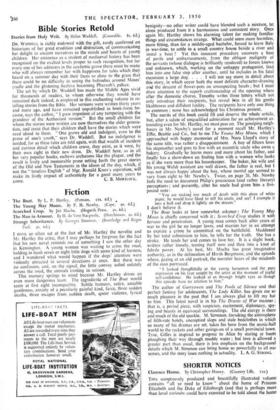Fiction
The Boat. By L. P. Hartley. (Putnam. 12s. 6d.) Paul: 9s. 6d.) I HAVE so often sat at the feet of Mr. Hartley the novelist and Mr. Hartley the critic, that I may perhaps be forgiven for the fact that his new novel reminds me of something I saw the other day in Kensington. A young woman was waiting to cross the road, holding in leash seven or eight little dogs with some kind of harness, and I wondered what would happen if the dogs' attention were violently attracted in several directions at once. But there was no confusion, and, on the signal, the little convoy sailed sedately across the road, the animals trotting in unison. This memory springs to mind because Mr. Hartley drives an even more dangerous team. The ingredients of The Boat would seem at first sight incompatible. Subtle humour, satire, amiable gentleness, anxiety of a peculiarly painful kind, farce, three sudden deaths, three escapes from sudden death, queer violence, lyrical benignity—no other writer could have blended such a mixture, let alone produced from it a harmonious and consistent story. Once again Mr. Hartley shows his alarming talent for making familiar things and circumstances strange. What could seem more harmless, more fitting, than for a middle-aged bachelor, forced to leave Italy in war-time, to settle in a small country house beside a river and instal a boat ? Yet this innocent procedure uncovers a host of perils and embarrassments, from the oblique malignity of the servants (whose dialogue is brilliantly rendered) to forces known and unknown, which, working on the unhappy protagonist, lead him into one false step after another, until he includes in his fatal excursion a large dog. . . . I will not say more in detail about this story, in which occur both the most delicate character-drawing and the descent of flower-pots on unsuspecting heads ; but I must draw attention to the superb craftsmanship of the opening where after the domestic chorus, Timothy writes three letters which not only introduce their recipients, but reveal I■im in all his gentle likableness and diffident futility. The recipients have only one thing in common ; none has acknowledged his Christmas present.
The merits of this book could fill and deserve the whole article, but, after a salute of unqualified admiration for an achievement as- tounding even for Mr. Hartley, we must pass on. The gossiping neigh- bours in Mr. Newby's novel for a moment recall Mr. Hartley's Effie, Beattie and Co., but to me The Young May Moon, which I
approached with happy memories of Mrs. Nora Lloyd's story of the same title, was rather a disappointment. A boy of fifteen loses his stepmother and goes to live with an eccentric uncle who owns a bakery. Gradually he learns more and more about his father, and finally has a show-down on finding him with a woman who looks as if she were more than his housekeeper. The baker, his wife and his young Welsh assistant are well drawn, the father is real, but I was not always happy' about the boy, whose mental age seemed to vary from eight to Mr Newby's. Twice, on page 26, Mr. Newby feels the need to document Philip's precocious (and rather literary) perceptions ; and presently, after his uncle had given him a five- pound note:
"You are making too much of death with this piece of white paper, he would have liked to tell his uncle, and see! I crumple it into a ball and drop it lightly on the stream."
I don't believe it.
The Boat looks at love somewhat askance ; The Young May
Moon is chiefly concerned with it ; Scorched Crop studies it with fervour and penetration. A young man comes 'back after years of war to the girl he no longer loves, and marries her in an attempt to expiate a crime he committed on the battlefield. Maddened by her total submission to him, he tells her the truth. She has a stroke. - He tends her and comes to love her. It is a slight book, written rather loosely, tensing itself now and then into a knot of febrile power. At his best, Mr. Mucha has great imaginative authority, as in the delineation of Hersh Bergmann, and the episode where, gazing at an old portrait, the narrator hears of the misdeeds of the man portrayed.
"I looked thougfftfully at the young horseman and the pure expression on his face caught by the artist at the moment of joyful self-confidence. He looked at us through bright eyes as though this episode bore no relation to him."
The author of Garryowen and The Pools of Silence and that perfect fantasy for adolescents, The Lady Killer, has given me so much pleasure in the past that I am always glad to lift my hat to him. This latest novel is in his The Drums of War manner; that is, a period piece, with suspicion, excitement, diplomacy, spy- ing and beauty in equivocal surroundings. The old energy is there and much of the old sparkle. M. Simenon, forsaking the atmosphere of fifth-rate hotels, unemptied slops and stale bedclothes in which so many of his dramas are set, takes his hero from the music-hall world to the rackets and other goings-on of a small provincial town. True, Gilles is inspired to propose to Alice by staring at boots ploughing their way through muddy water ; but love is allowed a greater part than usual, there is less emphasis on the background details which M. Simenon can bring home so powerfully to all our senses, and the story loses nothing in actuality. L. A. G. STRONG.


































 Previous page
Previous page